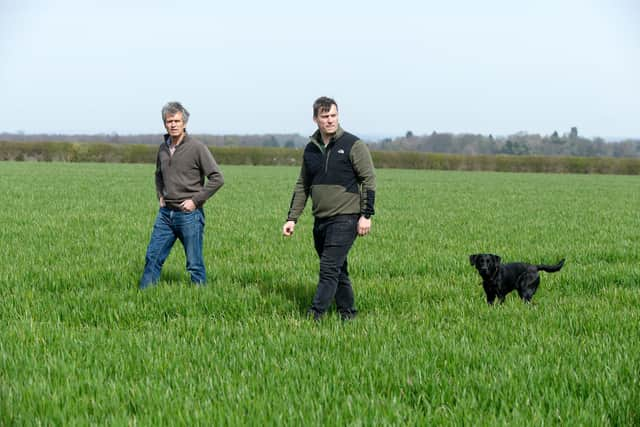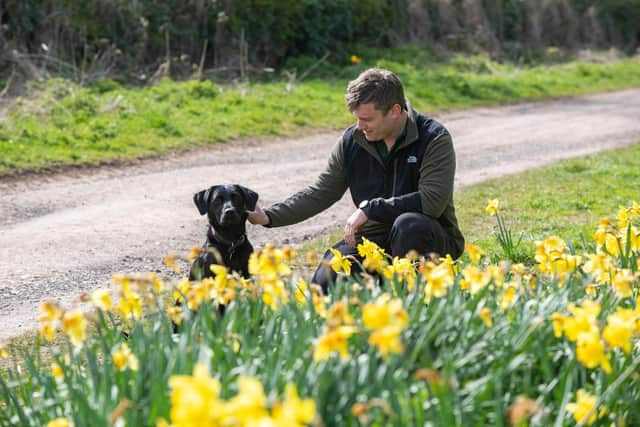Farm of the Week: Forward-thinking family who want to share their Yorkshire Wolds land with others
Adam Hayward rejoined his father Paul at Cold Harbour Farm in Bishop Burton in October last year where they have their own farmland, have a contract farming agreement, rent additional land and undertake contracting.
Adam said the farming operation that runs to around 1,500 acres overall sees them mainly involved with arable cropping, but that they also have a suckler herd. “We grow winter wheat, winter and spring barley, oilseed rape, vining peas and beans.
Advertisement
Hide AdAdvertisement
Hide Ad“Around 60 per cent of this year’s cropping is down to winter wheat which we grow predominantly for seed production. Our wheat yield is usually around 4 tonnes per acre but was marginally less last harvest.


“We specialise in seed because of the cleanliness of the land which goes back to my grandfather who adopted a zero-tolerance policy and was followed by my father who has continued a pretty aggressive policy using multiple rogueing and new chemistry when it is available to us. We work closely with our agronomist.
“Our farming philosophy is based on using all of the resources that we can. We see it as a team effort rather than just one single person’s approach.”
Adam said there is far more spring barley grown than winter barley and that oilseed rape plays an important role.


Advertisement
Hide AdAdvertisement
Hide Ad“Around 20 per cent of our acreage is barley. We have very little winter barley as there’s not the return for us. Our spring barley is grown for malting that we trade on the open market. We’ve recently invested in a new grain dryer and have our own on-farm grain stores.
“Oilseed rape is still a very good crop for us. It provides a great break in our rotation. It’s more expensive to grow these days that’s for sure but it’s hard to beat as a break from wheat. Beans are also grown as a break when we see a market for them.”
Adam said that he and his father like new technologies and they are always looking at new projects with latest advances, but that they’re not necessarily at the head of the queue.
“I certainly wouldn’t say we are an early adopter of any new technology. We will buy our new products off the shelf. The farm has incorporated much of the kit that many others have, including GPS steering, yield mapping and digital soil analysis.
Advertisement
Hide AdAdvertisement
Hide Ad“For us it is about greater attention to detail that you get from such as GPS and variable rate spreading. I wouldn’t say that variable rate spreading necessarily saves you much. It gives you more consistent crops overall giving a more even crop yield. It’s about us using all the tools that are available to us.
“We have recently been investing in soil mapping, working with Omnia and what is really interesting is seeing how much our soil varies. Ours is a chalk base, sat on the edge of the Yorkshire Wolds and prior to conducting soil mapping we had thought our soil was fairly consistent, but we have found that it varies a little more than we had imagined.
“We knew there were variations as there is on anyone’s land, but now that we have accurate records it allows us to make adjustments.”
Adam said he has seen how the farmed land operated has increased in size since his teenage years and that he and his father both have ideas over the future direction of the farm business.
Advertisement
Hide AdAdvertisement
Hide Ad“My dad has plenty of ideas and projects that he wants to continue doing. I see it as this team effort. He has way more knowledge when it comes to the arable and livestock operations.
“We employ a great team and they are a key part of the business. The way I see my role is that I don’t need to spend twenty hours a day driving a tractor. I see myself as the guy who manages attention to detail.
“There is no escaping being in an office. It doesn’t matter what sort of farmer you are, there is paperwork and that needs handling. I don’t mind that side of it.”
Cold Harbour Farm was home to a dairy herd run by Adam’s grandfather John Dunning and latterly Adam’s father Paul. Today it is a suckler herd of around 40 largely Belgian Blue-cross cows with calves sold as stores at market or to local farms.
Advertisement
Hide AdAdvertisement
Hide Ad“We have around 60-head at the moment, which we sell before finishing weight. I was asked by dad, while I was still at school age, whether I wanted to milk cows, because he was at the point where investment in new equipment was necessary.”
It was this early decision that saw Adam extend his skillset in a more commercial way.
“I didn’t want to milk cows for the rest of my life. Ironically, my career off-farm is now with De Laval, a major international manufacturer of dairy equipment.
“I have a career outside of farming as well as here now on the farm. I’d been with farm machinery manufacturers Claas since I was a student and spent three years with them in Australia.
Advertisement
Hide AdAdvertisement
Hide Ad"I’ve been based in the UK since 2015 and my work in a commercial role with De Laval means that I can operate from anywhere in the world. It’s not as though I have a toolbox and go around fixing machinery.”
Former foldyard buildings were converted to arts studios over a decade ago that Adam’s mum Heather operates and former pig buildings were turned to his sister Laura’s caravans and household storage business. Adam has visions of creating rural meeting space for businesses.
“Our family has always been forward thinking. Prior to structured payments for stewardship, my grandfather created a new public footpath right through the middle of our farm because he wanted to share our part of the countryside with others.”
